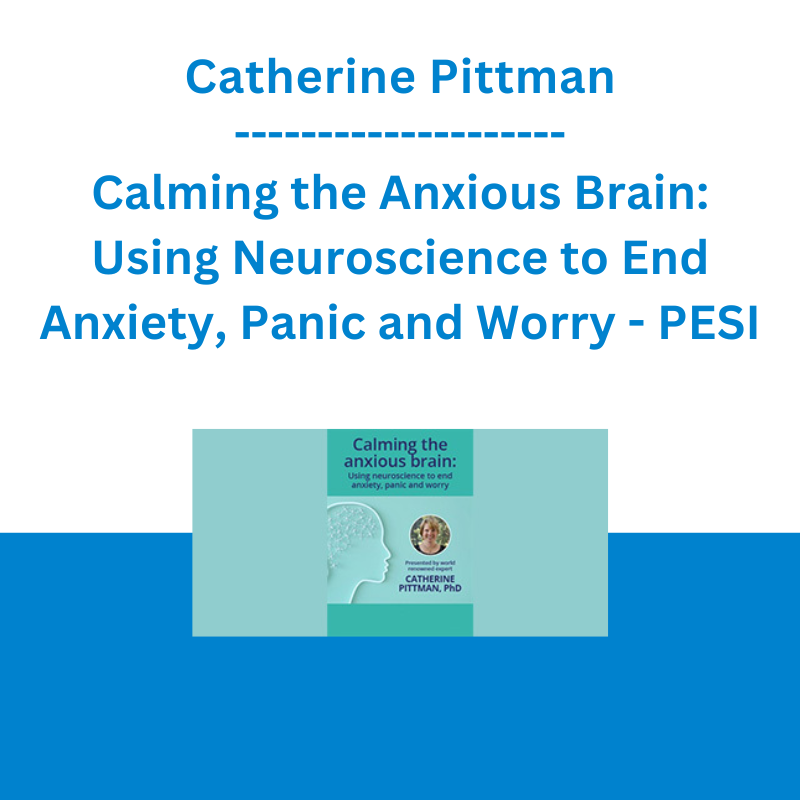*** Proof of Product ***
Exploring the Essential Features of “Catherine Pittman – Calming the Anxious Brain: Using Neuroscience to End Anxiety, Panic and Worry – PESI”
Speaker: Catherine Pittman, PhD, HSPP
Duration: 6 Hours 26 Minutes
Copyright: Oct 01, 2020
Media Type: Digital Seminar
Description
Join neuroscience and anxiety expert, Dr. Catherine Pittman, and learn her keys for successful anxiety treatment. Dr. Pittman integrates brain-based strategies for calming the anxious mind with client communication techniques that motivate change in your clients. Catherine’s approach promotes adherence to treatment and strengthens the therapeutic alliance- which is essential when working with anxious, worried, traumatized or obsessive clients.
Speaker
Catherine Pittman, PhD, HSPP
Saint Mary’s College
Catherine M. Pittman, Ph.D., HSPP has a background in cognitive behavioral therapy, neuropsychology, fear-conditioning research, and treated anxiety-based disorders in clinical practice for over 25 years. Her experience makes her uniquely qualified to provide a clear understanding of neuroscience and how that informs the selection and application of successful anxiety treatment strategies.
Dr. Pittman is the author of the popular book, Rewire Your Anxious Brain: How to Use the Neuroscience of Fear to End Anxiety Panic, and Worry (New Harbinger Publications). Her new book, Taming Your Amygdala, will be published in Spring 2022 (PESI Publishing & Media). Dr. Pittman is a professor of Psychology at Saint Mary’s College, Notre Dame, IN. She regularly presents workshops at national conferences and national webinars on anxiety treatment and is an active member of the Public Education Committee of the Anxiety and Depression Association of America.
Speaker Disclosures:
Financial: Dr. Catherine Pittman maintains a private practice and has an employment relationship with Saint Mary’s College. She receives royalties as a published author. Dr. Pittman receives a speaking honorarium, recording, and book royalties from Psychotherapy Networker and PESI, Inc. She has no relevant financial relationships with ineligible organizations.
Non-financial: Dr. Catherine Pittman is a member of the Anxiety and Depression Association of America.
Objectives
- Determine the underlying neurological processes that impact anxious symptoms for clients.
- Develop client engagement in treatment using personalized goals and attending to the therapeutic relationship.
- Evaluate the differences between amygdala-based and cortex-based anxiety symptoms and identify how these symptoms inform treatment interventions.
- Practice strategies for calming and training the amygdala in order to alleviate symptoms of anxiety.
- Integrate methods for teaching clients to retrain the cortex so that anxiety is resisted rather than exacerbated.
- Analyze how psychotropic medication impacts neuroplasticity in the brain; identify related treatment implications.
- Build examples to illustrate how the anxious brain functions and understand how to use that information to improve client motivation and treatment outcomes.
Outline
Limitations and Objectives
Positives and Negatives of using neuroscience in te treatment of anxiety
Enhancing Client Engagement
Goals of client
Taking a Neurological Perspective
- Intro to Neuroscience
- Explaining Neuroscience to Clients
Managing the Amygdala
Managing the Cortex
- Mindfulness and Focus
Neurologically Informed Cognitive Restructuring
Interventions
Target Audience
- Psychotherapists
- Counsellors
- Social Workers
- Psychologists
- Addiction Counsellors
- Psychiatrists
- IAPT Practitioners
- Nurses
- GPs
- Other Mental Health Professionals
Please see the full list of alternative group-buy courses available here: https://lunacourse.com/shop/










 Oliver Velez - Essential Strategy Of Trade For Life
Oliver Velez - Essential Strategy Of Trade For Life  Dave Landry - Stock Selection Course
Dave Landry - Stock Selection Course